
The Grupo Especial de Operaciones (GEO), GEO pronounced HAY-oh, is the police tactical unit of Spain's National Police Corps. The GEO has response capabilities and is responsible for VIP protection duties, as well as countering and responding to terrorism. Organized along the lines of many other police tactical units throughout Europe, the GEOs is focused on dealing with terrorist attacks, including aircraft hijackings as well as maritime threats and hostage taking. The GEO can also be used in a support role for Spanish Police operations outside the realm of terrorism, and is active in protecting visiting heads of state and providing security for high-profile events such as the 1992 Summer Olympics held in Barcelona. The GEO is a member of the ATLAS Network, that includes all the national police tactical units of European Union countries and some countries outside the European Union.

The Spanish Legion, informally known as the Tercio or the Tercios, is a unit of the Spanish Army and Spain's Rapid Reaction Force. It was raised in the 1920s to serve as part of Spain's Army of Africa. The unit, which was established in January 1920 as the Spanish equivalent of the French Foreign Legion, was initially known as the Tercio de Extranjeros, the name under which it began fighting in the Rif War of 1920–1926. Although foreign recruitment spans the Spanish-speaking nations, the majority of recruits are Spaniards. Over the years, the force's name has changed from Tercio de Extranjeros to Tercio de Marruecos, and by the end of the Rif War it became the "Spanish Legion", with several "tercios" as sub-units.
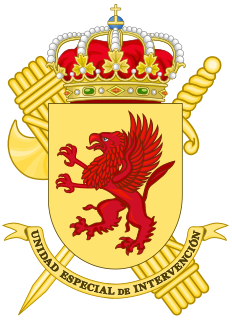
The Unidad Especial de Intervención (UEI) is the Police Tactical Unit of the Guardia Civil, the Spanish gendarmerie.

The National Police Corps is the national civilian police force of Spain. The CNP is mainly responsible for policing urban areas, whilst rural policing is generally the responsibility of the Civil Guard, the Spanish gendarmerie. The CNP operates under the authority of Spain's Ministry of the Interior. They mostly handle criminal investigation, judicial, terrorism and immigration matters. The powers of the National Police Corps varies according to the autonomous communities. For example, Ertzaintza in the Basque Country and Mossos d'Esquadra in Catalonia are the primary police agencies. In Navarra they share some duties jointly with Policía Foral (Foruzaingoa).
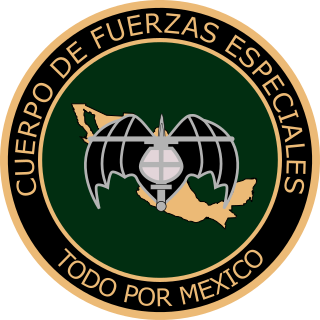
The Mexican Special Forces Corps is a special forces unit of the Mexican Army. Formerly the Special Forces Airmobile Group (Spanish: Grupo Aeromóvil de Fuerzas Especiales) or GAFE, the SF corps has six battalions; one is the Fuerza especial de reaccion, a quick-response unit, and one is assigned to the Paratroopers Rifle Brigade; the motto of the SF Corps is Todo por México.
Special Operations Group may refer to:

The Brigada Especial Operativa Halcón is a special operations division of the Buenos Aires Provincial Police in Argentina.

In Mexico, both the army and navy have special forces groups or elite units.
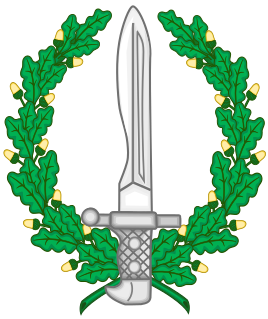
The Special Operations Groups are the special operations forces of the Spanish Army.

The Special Operations Group is the police tactical unit of the Public Security Police (PSP) of Portugal. GOE was created in 1982 and has around 200 operatives. Although a police unit, the GOE is employed worldwide, similar to the French GIGN or to the German GSG 9.

The Special Operations Command is the command charged with overseeing the various Special Operations Groups of the Spanish Army.
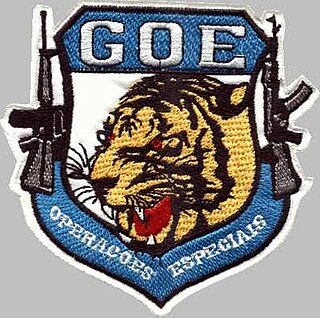
Grupo de Operações Especiais, mostly known by its acronym GOE, was the police tactical unit of the Civil Police of the state of São Paulo, Brazil. It was comparable to Rio de Janeiro's CORE. In 2019, the Governor of the State of São Paulo, João Dória, extinguished the group and its members were moved to the newly created Department of Strategic Police Operations.
Spain has a long history of combating domestic and international violence and of training units for special warfare or intervention. The following military and police units currently operate under a Special Operations mandate:
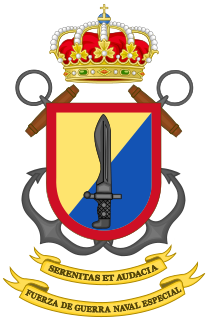
The Special Naval Warfare Force (FGNE) is the special forces unit of the Spanish Navy. It was created on June 10, 2009 through the fusion of the Special Operations Unit (UOE) of the Spanish Navy Marines and the Special Combat Divers Unit (UEBC) of the Navy Diving Center. Before the fusion, between 2004 and 2009, the two units operated under a single Special Naval Warfare Command. Between 1967 and 2009, the special operations of the Spanish Navy were conducted by the UOE, whose many traditions the FGNE adopted – including the use of the special forces "green beret", the Capacitación selection course, and the organization of operational units into Estoles. Inheriting the reputation and continuing the record of the UOE, the FGNE "has long been one of Europe's most respected special forces."
The structure of the Spanish Army as of April 2021 is as follows:












